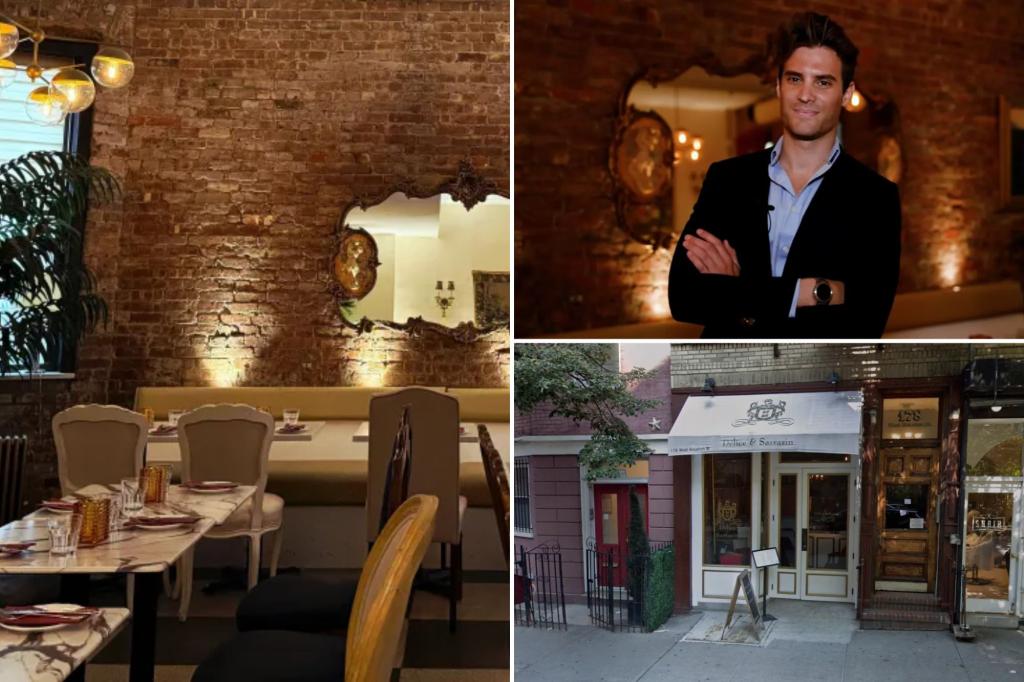This vegan joint just can’t beet congestion pricing.
West Village plant-based French eatery Delice & Sarrasin claims the controversial e-tolling program has led to delivery surcharges from distributors that are so high they are facing the prospect of going out of business.
“We’re at this point now when we’re just open to pay bills,” owner Christophe Caron told The Post, estimating the 12-year-old eatery has just three to six months left before it goes under.
Two of Caron’s restaurant suppliers began issuing $10 surcharges for each delivery after congestion pricing’s onset in January, he told The Post — and the fees are quickly adding up.
“By the end of the year, [I’ll be paying] up to $2,000 just for one supplier, minimum,” he added. “[For all my suppliers], it’s more like $8,000 to $10,000.”
The inflated delivery prices are coupled with already sky-high ingredient costs, the restaurant owner said, pointing to a $300 increase in the wholesale price of a 40-pound bag of dark chocolate within the last three years.
The lingering impacts of the pandemic are adding insult to injury, he said, adding that he’s observed less customers eating out on average compared to pre-pandemic levels.
“When I was doing research on the customer level …. [customers] said they go out less and spend less, and they’d rather save money for travels now that everything is expensive,” he said.
Caron reports that, while he’s witnessed a decline in walk-in and reservations since 2023, last January saw a dramatic drop in customers – and happened nearly overnight on Jan. 5, when congestion pricing took effect below 60th Street.
“We’ve been open for 12 years, and each year we’ve seen an increase in traffic … until the pandemic happened,” he said. “In January, it was instant. We noticed right away [foot traffic] was down almost 70%.”
Caron isn’t alone, he contends: “If only you knew the amount of restaurants I know that are hanging by a few cents. Everyone’s telling me the same thing: something is about to collapse in New York, but people are not aware.”
Andrew Rigie, executive director of the NYC Hospitality Alliance, told The Post several restaurants have reported “business is off” and blame congestion pricing for declining patronage since January.
“We’ve heard a lot of frustration from restaurants located in the congestion zone that many of their product and service providers are adding congestion pricing surcharges to their bills or increasing prices to offset the fee, making it even more expensive to run a small business,” Rigie said.
“We warned all along that congestion pricing would result in price increases and surcharges to small businesses, making it even more expensive to run a restaurant or bar,” he added. “That’s exactly what’s happening, and why they should exempt these essential goods from the fee because they must be driven into the zone and can’t be delivered on the subway or a bus. A restaurant’s fish delivery can’t take the 6 train.”
Food distributor Sysco told businesses that it would be adding a $1 “congestion charge,” in addition to an existing fuel charge, to all deliveries within the “impacted area,” The Post previously reported. Anheuser-Busch, whose brands include Budweiser, Michelob Ultra, Stella Artois and Corona, similarly raised keg prices by $5 across the board for customers throughout the NYC area.
Cintas, which provides uniforms, aprons and cleaning supplies, increased its prices on Jan. 5 – the same day congestion pricing took effect.
The two suppliers that don’t charge Caron congestion fee-related surcharges — Baldor and Ace — “mentioned that [congestion pricing] might be reflected on the prices, so we don’t really know where the cost is being distributed,” Caron said.
A rep for Baldor denied that the company has increased its prices due to congestion pricing — but Caron maintains “the prices went up for sure” after Jan. 5. A rep for Ace did not immediately respond to a request for comment.
Baldor’s senior vice president of logistics Seth Gottlieb previously told The Post its plan is to “offset the cost internally.”
“We are trying to stay above 60th Street and search for opportunities for our customers to take deliveries overnight,” Gottlieb added.
Congestion pricing will cost the distributor up to $500,000 a year under the current plan, he said.
In a statement issued last month, Baldor affirmed that it wouldn’t be issuing tolling-related surcharges to its restaurant clients — but smaller distributors that can’t absorb the cost will have to pass it along.
“Ultimately, that means small businesses, like restaurants and bodegas, see their costs rise,” the distributor wrote, “and they, too, find themselves with no other option but to pass on the added cost to end consumers.”
Read the full article here

